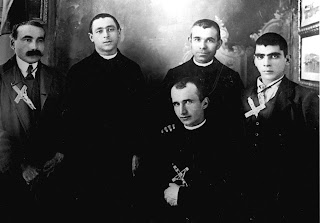11TH July 2013
St. Benedict
Dear Confreres and Consoeurs, and Friends of the Orionine Family,
We wish to announce to you that from 20th October 2013
until 8th December 2014 we shall celebrate the ORIONINE
MISSIONARY YEAR, commemorating the departure of the first missionaries sent
by Don Orione from Genoa to Brazil.
On 17th December 1913, 100 years ago, at 4pm, the first
Orionine missionaries left Genoa for Brazil on the ship named “Tomaso de
Savoia”. The missionaries disembarked at the port of Santos on 29th
December 1913 and, travelling by train, reached their destination, Mar de
Espanha, in the State of Minas Gerais, on 2nd January 1914.
That departure was the first opening of the Congregation beyond the
borders of Italy. It is an important date because it signifies the
beginning of the embrace of the peoples in the name of Don Orione. After
that the embrace of Don Orione reached many other peoples! Today we are
present in 32 countries.
At the end of the Year of Faith, the Little Work of Divine
Providence will celebrate the Orionine Missionary Year, from 20th
October 2013 until 8th December 2014
The beginning will take place at the Marian Shrine of Aparecida, in
Brazil, in the context of the pilgrimage of the Orionine Family in Brazil at
the end of the General Assembly of the Sons of Divine Providence and will be
the occasion of a vast gathering of Orionine men and women religious and lay
people.
It is a centenary which is important for the entire Orionine Family.
In this missionary year we intend to celebrate the meeting of Don
Orione, personally, or through his Sons and Daughters, various nations:
Argentina, Uruguay and Palestine in 1921, Poland in 1923, Rhodes (now Greece)
in 1925, the U.S.A. in 1934, England in 1935, Albania in 1936, while Don Orione
was still alive, then all the others: Chile in 1942, Spain in 1951, the Ivory
Coast in 1971, Madagascar in 1976, Jordan in 1982, Venezuela in 1985......up to
India in 2002 and Mozambique in 2003.
The Little Missionary Sisters of Charity have walked the missionary
paths together with the Sons of Divine Providence. They remember in
particular the 90th anniversary of the beginning of the LMSC in
Poland, in 1924, and the sending of the first Missionary Sisters to Argentina
in 1930. In 2015 they will celebrate the Centenary of the beginning of
the Congregation.
With the celebration of the Orionine Missionary Year we propose
three aims:
- To thank the Lord for the history of the Congregation which in itself is a history of mission;
- To celebrate in our common origins the unity of the Orionine Family in the world with a renewed commitment to creative fidelity to the Charism;
- To revive the missionary ardour typical of our Orionine identity, also in response to the continual appeals of Pope Francis for a “Missionary Church”.
To this end, we invite all the Communities and Provinces to celebrate in
each nation the arrival of the Orionine charism and the foundation of the first
institutions, even if the anniversaries are less than 100 years. In fact,
that first missionary expedition of 17th December 1913 included the
missionary drive right from the heart of Don Orione which was seconded by the
generosity of many of his Sons and Daughters and brought about all the later
openings.
We are sure that every spiritual, public, personal, community and
congregational and civil event will do good to us and to the people among whom
we live.
However, we, men and women religious celebrate the Orionine
Missionary Year not only as a historical event with “external” initiatives,
but above all as an interior event, as a vocational reminder to return to “the
sources” of the radical centrality of Christ, of charity, of the salvation of
souls. Remember the two objectives signed in blood by the young Orione
and Vaccari? “1st: who will have saved more souls in the
first place. 2nd : who will become more holy”. Our
identity is here. The glory of God and our happiness is here.
As we once more thank the Lord for having given us Don Orione and his
charism, spread today among many peoples, let us ask Mary, “our Heavenly
Mother and Foundress”, to spread her blue mantle over us and over so many
people that are entrusted to our missionary zeal.
Sr Mary Mabel
Spagnuolo
Fr
Flavio Peloso
Superior General
PSMC
Superior General FDP





